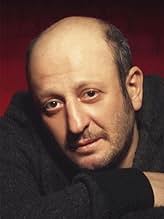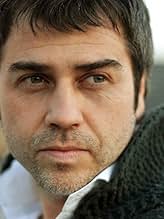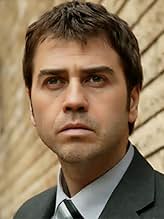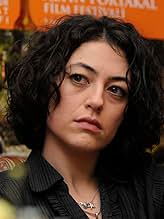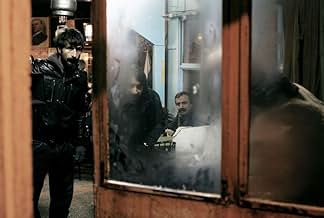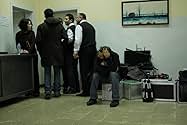A man's life, thoughts, feelings and his very own darkness... Adapted from Dostoevsky's novel "Notes from Undergroud", Demirkubuz follows Muharrem as he gets himself invited to a party where... Read allA man's life, thoughts, feelings and his very own darkness... Adapted from Dostoevsky's novel "Notes from Undergroud", Demirkubuz follows Muharrem as he gets himself invited to a party where he is not welcome, just to find himself disgusted.A man's life, thoughts, feelings and his very own darkness... Adapted from Dostoevsky's novel "Notes from Undergroud", Demirkubuz follows Muharrem as he gets himself invited to a party where he is not welcome, just to find himself disgusted.
- Director
- Writers
- Stars
- Awards
- 14 wins & 6 nominations total
- Türkan
- (as Nihal Yalcin)
- Feridun
- (as Feridun Koc)
- Taksici
- (as Suleyman Arda Emince)
- Director
- Writers
- All cast & crew
- Production, box office & more at IMDbPro
Featured reviews
But this film, is overall not a great one. The biggest problem with it is the script, which I guessed that it was written by Demirkubuz himself. I felt like it was written for the international audiences. But for a native-Turkish speaker, it's unbearably alienating. While there are much profanity, it doesn't feel natural. Maybe that's because as a Turkish person, I am familiar with almost the entire cast, and that's why I expected them to be natural. Acting wasn't bad, as all the cast are talented actors. But writing was annoyingly unnatural that I felt it was kind of a Sheakspearen play. It's not probably because I am familiar with the cast. Characters are dressed in Turkish, they act in Turkish, but their language is somehow artificial. Even the language of Türkan, which is a character designed with traditional elements from head to toe, sometimes felt artificial.
While the story is well-written, directing ruins it a bit. Events are enjoyingly proper for character's journey, but the directing was distracting and not inviting. Long-shots are weak at telling characters' emotions and state of mind. Instead, it's just tiring and distracting.
I prefer the actors to be chosen from unknown people, still it's no big deal as long as it's all the right choices. But here, casting is also unsuccessful. Actors are talented but they all tend to go to a realistic and natural acting, while the script forces them back to synthetic performances. So everyone seems odd in this annoying and obvious dilemma. I also sadly think that Engin Günaydın is not the right choice for Underground Man. He is superb when it comes to absurd, exaggerated characters as well as calm and nervous personalities. But for a furious, unstable and needy but pathetically proud person like Underground Man, he is insufficient (his look is suitable but that's not the point). There was just one point towards the end of the film where Muharrem was seen in close up. That moment the anger was great and proper but it was a one hit wonder anyway.
Viewer's connection with the character is also weak. If you're big fan of Engin Günaydın, you may easily sympathize with the character. But director cannot create either positive or negative connection between the character and viewer. I neither hated or loved the character. I was all indifferent with the things happening around him. And this is, in fact, the biggest failure of the film. In the novel, even if you are bored by the thoughts of the character, you can sympathize with the things and situations that the character faces. This feeling of familiarity, 'finding yourself in it' feeling is the core of the novel's success and it's legacy. This film lacks that feeling. Director could have chosen to make the audience hate the character, but even this wasn't intended at all.
Of course, adapting such a book is challenging as hell. But when I see this great environment, I think much better could have been done with the story. Not ironically, but quite comprehensibly, best acting credit goes to Nergis Öztürk, which plays the Fahişe character, who probably has the least lines. She fired the only emotions that I felt throughout the film. Her dullness and ignorance, with a feeling of neediness were wonderful that she was the only one who felt 'real'.
Following the novel once more, Muharrem encounters Fahise (Nergis Öztürk) a young prostitute with whom he goes to bed. He confronts her with a savage image of her future; but she ends herself enthralled by his seemingly poignant grasp of society's ills. He gives her his address and leaves. They re-encounter at the end; he curses her and takes back everything he said to her, saying he was, in fact, laughing at her and reiterates the truth of her miserable position. Near the end of his painful rage he wells up in tears after saying that he was only seeking to have power over her and a desire to humiliate her. He begins to criticize himself and states that he is in fact horrified by his own poverty and embarrassed by his situation. Fahise realizes how pitiful he is and tenderly embraces him.
Director Zeki Demirkubuz"s desire to follow the source-text so closely emphasizes his debt to Dostoyevsky - which was also evident in BEKLEME ODASI (2003). Both writers are interested in the futility of existence, where people end up doing the same thing every day to little or no effect. In YERALTI Muharrem is a civil servant sitting in an office trying to do his job, but finds that life has nothing to offer him. Inspired by nature programs on television, he conceives an alternative existence where he imagines himself as a predatory animal, cleaning itself before going in for the kill. Through a series of voice-overs we learn what his true feelings actually are, and how radically they differ from his actual behavior in front of others. In the end, however, he realizes that this alternative role is nothing but a sham, a way of diverting him from the essential meaninglessness of existence. Left alone in his apartment on a gray, cold morning, he becomes aware of this truth.
The film contains several of Demirkubuz's familiar stylistic devices designed to draw our attention to Muharrem's plight - the long shots focusing on his side profile, the point of view shot showing him traveling through an apparently never-ending tunnel in a taxi, and the blurred point of view shots that reduce Turkey's capital city into a threatening phantasmagoria of grays, blues and blacks. Never has the city looked so threatening or uninviting.
Did you know
- TriviaThe movie Muharrem watches on his TV (Masumiyet) is also a film by Zeki Demirkubuz.
- Quotes
Muharrem: You may all be thinking the same thing about me. I can understand that. But the way you talk about all of you as one person confuses me! I am having trouble with which one of you to say my words to. It will be better if everyone speaks for himself. Besides, they may have their own opinions; if you keep saying "we" and "we" then how can they say it?
- ConnectionsFeatures Innocence (1997)
- How long is Inside?Powered by Alexa
Details
Box office
- Gross worldwide
- $273,748
- Runtime1 hour 47 minutes
- Color
- Aspect ratio
- 2.35 : 1
Contribute to this page


